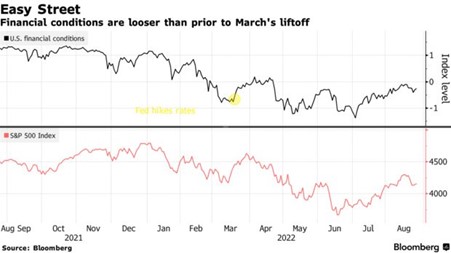The Federal Reserve is made up of several regional Feds, and Kansas City plays a very key role in their calendar as it hosts the Jackson Hole Economic Policy Symposium (known simply as “Jackson Hole”). This annual event is the key interactive event between the Fed and other policymakers, academics and economists. This year’s theme is Macroeconomic Policy in an Uneven Economy.
The title of the event spells out the problem for the Fed. The primary aim of Monetary Policy is to keep inflation under control and it is currently clearly not travelling at a trajectory consistent with that aim. The Fed has been raising rates since March and doing their best to communicate that rates will continue to rise whilst prices are surging.
The conundrum they face is that price rises have almost never been halted without significant demand destruction. This means that after every period of inflation the price surge only abates because of a contraction or recession. Older readers might remember Paul Keating talking about the recession we had to have.
Markets have been buoyant since the last rate hike by the Fed in late July knowing there was no Fed Board meeting in August and signs that the economy was slowing. Fed officials have been quoted regularly trying to impress upon the market that they are not finished and the buoyancy is premature.
This week the message seemed to resonate more with both interest rate and equity markets pricing in a more extended period of tightening and pushing the timing of the “inevitable” recession into late 2023 and beyond.
Jackson Hole looms as a major event because any sign that the Fed is weakening its resolve will be met by a relief rally that would be counterproductive to their aims. It seems clear that the message will be one of frugality and tough measures.
To illustrate the Fed’s predicament and reiterate why Jackson Hole has to deliver a disappointing message the chart below shows that financial conditions in the US are actually looser than they were back in March when they started tightening. The former Chair of the Fed Ben Bernanke has been widely quoted as saying that monetary policy is 98% talk at 2% action. It appears that the talk so far has not been effective in achieving the result they are after.

A small relief rally on Thursday night after a weak week was more about dealers cutting short positions than a sign the market could resume its path to recovery. This weekend the artillery is loaded and the most likely scenario is a very strident Fed accepting that whilst a recession might be the unfortunate consequence of the fight against inflation, that is a secondary consideration. Valuations based on a tempering of yields seems likely to be premature and it may be that rates markets begin to reprice a steeper economic pullback because of these higher rates, the timing will be later than currently priced in.
In the event the Fed does actually acknowledge that causing a recession would be an undesirable outcome, it is quite likely that risk markets would react incredibly positively. It is a low probability but high consequence outcome as there has been a significant build up of cash in investment pools which may have to get invested quite quickly.
Either way this weekend’s meeting outcome will be critical for markets and is likely to be the key influence for the US particularly over the next month. The Fed Board does not meet again until September 21 and the conversation post Jackson Hole will be dominated by how much they will have to hike on that date.
The views expressed in this article are the views of the stated author as at the date published and are subject to change based on markets and other conditions. Past performance is not a reliable indicator of future performance. Mason Stevens is only providing general advice in providing this information. You should consider this information, along with all your other investments and strategies when assessing the appropriateness of the information to your individual circumstances. Mason Stevens and its associates and their respective directors and other staff each declare that they may hold interests in securities and/or earn fees or other benefits from transactions arising as a result of information contained in this article.



